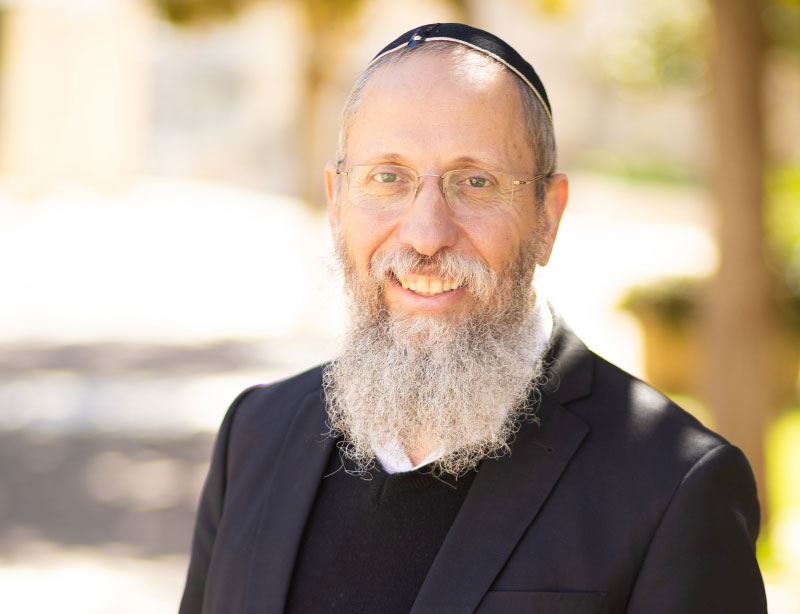July 3, 2023|י"ד תמוז ה' אלפים תשפ"ג Chukas-Balak 5783 - Feeding the Good Wolf
Print ArticleThere is an old Native American parable that goes something like this:
An old grandfather is teaching his grandson about life. “A fight is going on inside me,” he said to the boy. “It is a terrible fight and it is between two wolves. One is evil – he is anger, envy, sorrow, regret, greed, arrogance, self-pity, guilt, resentment, inferiority, lies, false pride, superiority, and ego.”
He continued, “The other is good – he is joy, peace, love, hope, serenity, humility, kindness, benevolence, empathy, generosity, truth, compassion, and faith. The same fight is going on inside you – and inside every other person, too.”
The grandson thought about it for a minute and then asked his grandfather, “Which wolf will win?”
The old Grandfather simply replied, “The one you feed.”
When Balak, the King of Moav, sends a message to Bilaam the great prophet, requesting his services to curse Am Yisrael, he says to him the following:
(ו) וְעַתָּה לְכָה נָּא אָרָה לִּי אֶת הָעָם הַזֶּה ]כִּי עָצוּם הוּא מִמֶּנִּי אוּלַי אוּכַל נַכֶּה בּוֹ וַאֲגָרְשֶׁנּוּ מִן הָאָרֶץ[ כִּי יָדַעְתִּי אֵת אֲשֶׁר תְּבָרֵךְ מְבֹרָךְ וַאֲשֶׁר תָּאֹר יוּאָר:
Now, please curse for me this nation… for I know, that the one you bless is blessed, and the one you will curse will be cursed.
Rav Yisrael Meir Druck, in his sefer Eish Tamid asks two questions: One is more technical, and one is more general:
1) The language of the request is mixed up, specifically the tense that is used in each side of the pasuk is not the same:
When it comes to the bracha, Balak says to Bilaam, asher tevareich, Mivorach, that which you bless, HAS BEEN BLESSED, in the past tense.
When it comes to the klala, the curse, he says, “V’asher TAOR YUAR”, in the future, that which YOU WILL CURSE WILL BE CURSED!
Why the difference?
2) If Balak was afraid of Bnei Yisrael attacking his nation, and he believed strongly in Bilaam’s ability to curse and to bless others, Why didn’t he just ask Bilaam to BLESS HIM AND HIS PEOPLE!? Presumably with more bracha on their side they also could have thwarted the attack of Bnei Yisrael. Why does he choose, instead, specifically to ask Bilaam to CURSE Bnei Yisrael?!
Rav Druck answers as follows:
Do you know why Balak didn’t ask Bilaam to BLESS Am Yisrael? Because Balak knew that Bilaam didn’t have the power to bless. He ONLY had the power to curse.
The Seforno writes this explicitly: He says why did Balak say “Asher tivarech mevorach” those you bless were blessed? Because it wouldn’t be nice to say to someone, “I know you’re amazing at cursing people!” So, he said, “I heard you’re amazing at blessing and at cursing!” He just said both in order to show extra kavod to Bilaam, to hopefully convince Bilaam to work with him, but he knew that blessing was out of Bilaam’s league.
But why did Bilaam have the power to curse and NOT the power to bless?
Chazal tell us in the gemara in brachos 7a that Bilaam knew had figure out the moment Hashem was angry and then to mention the sins of a person. And this was because Bilaam was a person who was constantly looking out for the negative in others.
The Mishna tells us in Pirkei Avos about the midos, the character traits that were reflected in those who are considered the “students” of Bilaam:
עין רעה ורוח גבוה ונפש רחבה מתלמידיו של בלעם הרשע
Someone who has an evil eye, meaning they look and search out the negativity and faults in others, and yet, are also looking to embellish and inflate how others see them, that is a student of Bilaam.
We’ve all had that experience. We all know an individual who is an expert in one extreme or the other. People who know how to dissect every positive thing they see another person do and explain why it’s negative. To find the faults, the blemishes, the negative aspects of just about anyone they see. To be a person with an Ayin Raa.
And then there are people who are just the opposite. People who are able to look at every person they encounter, no matter the negative experience they may have had with them, and to find some positive element in that person. Something about them which is wonderful and pure and special. To be a person who has an Ayin Tova.
And that, says Rav Druck, is why Balak didn’t ask Bilaam to BLESS
the people of Moav. Because he knew was incapable
of bestowing a bracha on someone else.
Because just like the ability to curse another person is dependent on our ability to see the negative, if we want to have the ability to bestow bracha on a person, we need to have the ability to see the positive, to reveal the goodness that is found inside each and every person.
As the same Mishna in Avos states: Just as there are traits for those who are the students of Bilaam, there are also traits of those who are the students of Avraham Avinu:
עין טובה ורוח נמוכה ונפש שפלה
Those who look for the good in others, and who aren’t interested in the fanfare given to themselves.
And with this, Rav Druck also addresses how we can read our pasuk.
When it comes to your ability to curse, “ASHER TAOR YUAR” those who you will curse, they will absolutely be cursed BECAUSE OF YOU. Because, unfortunately, you are a person who has that Ayin Raa, you are the EXPERT at searching out the negative in others.
And in reference to the bracha why does it say “Asher Tivarech mivorach” in the past? Because what Balak is actually saying is that those who appear to have been blessed by you, Bilaam, I know it has NOTHING to do with you. They were MEVORACH in the past tense. They must have already been blessed. Because to bestow a bracha on another person requires us to have the ability to see the good in that person.
But one could argue: Sometimes it’s so hard to see the good in others. Some people are particularly good at displaying their negative sides for all of us to see.
So how do we become students of Avraham Avinu?
The Meor Einayim, Rabbi Menachem Nachum of Chernobyl (1730-1797), a student of the Baal Shem Tov and the Maggid of Mezerich, (Chukas) writes, why does the pasuk sayואהבת לרעך כמוך, ', to love others “as yourself”?
And he explains that when it comes to ourselves, when we see something negative, a mida, a certain tendency, we don’t say “I’m bad”. We say, “I wish I could control that negative piece of me better”. We don’t see the negative in ourselves as a reflection of who we are in total. But somehow when we see a failing in someone else, we very easily see it as a reflection of the entirety of the person.
And thus, the Torah tells us, “V’Ahavta L’Reiacha Kamocha”, when you are looking at someone else, make sure to look at him or her like we all look at ourselves. Recognize that even if he or she has failings, WE ALL DO. And just as we see ourselves as FUNDAMENTALLY GOOD but with some flaws, we should try to see that in others as well. Because we have the ability to CHOOSE which path we take.
Or, as the old Native American grandfather told his grandson, we all have the ability to choose which wolf will win the battle inside us. It just depends on which one we feed.
Yes, life really is about deciding whose student we would like to be, that of Bilaam or that of Avraham. Finding the good in those around us, so we can find the power to bring more bracha into their lives and ours.




